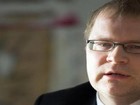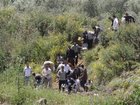Spotlight
Estonian Foreign Minister Urmas Paet said on Tuesday that Lebanese authorities had information indicating seven Estonian cyclists kidnapped three months ago in the Bekaa Valley were still alive.
"According to the information I got from Lebanon's president, the kidnapped Estonians are alive and work to free them continues," Paet told Estonia's Kuku radio from Beirut on Tuesday.
 Full Story
Full Story
Lebanon's authorities have released all Syrian refugees in Lebanon who had been detained for not having identity papers, activists said on Tuesday.
"Lebanese authorities have now released all Syrians who fled into Lebanon and were later detained for not having identity papers," human rights lawyer Nabil Halabi, who heads the Lebanese Institute for Democracy and Human Rights, told Agence France Presse.
 Full Story
Full Story
U.N. Special Coordinator for Lebanon Michael Williams welcomed on Tuesday the “positive role” played by Speaker Nabih Berri in the formation of the government.
“I welcomed the formation of the Lebanese government last week and also the particular role that Speaker Nabih Berri played, the positive role, in the formation of the government,” Williams said after holding talks with head of the Amal movement.
 Full Story
Full Story
Maronite Patriarch Beshara al-Rahi wished the new government success on Tuesday in order for it to meet the people’s high expectations given the crises in the Middle East.
He made his statements from the Vatican, where he arrived on Sunday to take part in the Middle East synod.
 Full Story
Full Story
Prime Minister Najib Miqati has stressed to foreign diplomats that Lebanon would remain committed to international resolutions including the Special Tribunal for Lebanon.
During separate meetings he held with Arab and Asian ambassadors, and U.S. Ambassador Maura Connelly on Monday, Miqati said that Lebanon is committed to the tribunal that will try ex-Premier Rafik Hariri’s suspected assassins.
 Full Story
Full Story
Tripoli Mufti Sheikh Malek al-Shaar has hoped for the announcement of a leadership council over the weekend to contain any incident that could erupt in the northern city.
In remarks to al-Liwaa daily published Tuesday, al-Shaar said that a committee was formed on Monday after a meeting held between al-Mustaqbal bloc leader Fouad Saniora and Tripoli MPs and officials.
 Full Story
Full Story
Progressive Socialist Party leader MP Walid Jumblat has expressed fears that the U.S. will settle scores with Syria in Lebanon through targeting the new Lebanese cabinet.
“According to the opposition and the so-called international community, this is Hizbullah’s cabinet, which means Syria’s (government),” Jumblat told al-Akhbar newspaper on Tuesday. “Then avenging Damascus would be by a fierce battle through imposing sanctions on Lebanon.”
 Full Story
Full Story
Meetings held between top March 14 officials and former Premier Saad Hariri in Paris were aimed at finding ways to confront the new cabinet “after the constitutional coup entered its second stage,” said a high-ranking official in the coalition on Tuesday.
The March 14 forces had said that the collapse of Hariri’s cabinet in January was the result of a coup staged by Hizbullah and its allies. In remarks to al-Liwaa newspaper, the official considered the formation of Prime Minister Najib Miqati’s government as the second stage of the coup.
 Full Story
Full Story
President Michel Suleiman has said the containment of the deadly clashes in the northern port city of Tripoli last week were “a sign that the cabinet is capable of preserving stability,” stressing that its lifespan depends on the level of its performance.
In his first interview after the formation of Premier Najib Miqati’s government, Suleiman told An Nahar daily published Tuesday that the Tripoli “test succeeded in (enabling the cabinet) to hold a grip on the security situation."
 Full Story
Full Story
The Phalange Party stated on Monday that the clashes in Tripoli would not have erupted had the Lebanese parties maintained their neutrality regarding the developments in Syria.
It said in a statement after its weekly politburo meeting: “It’s unfortunate that Syria is maintaining its negative policies towards Lebanon instead of tackling its accumulating internal affairs and introducing reform before it’s too late.”
 Full Story
Full Story




